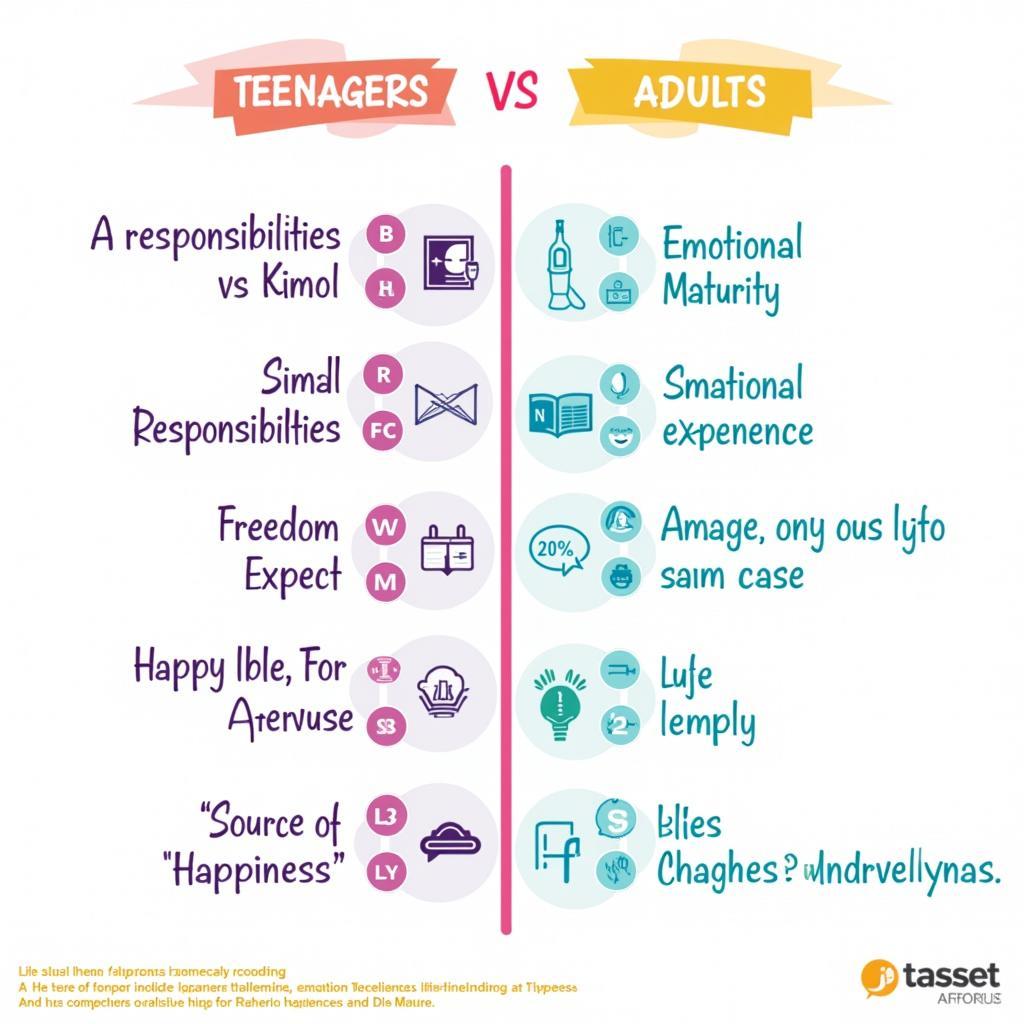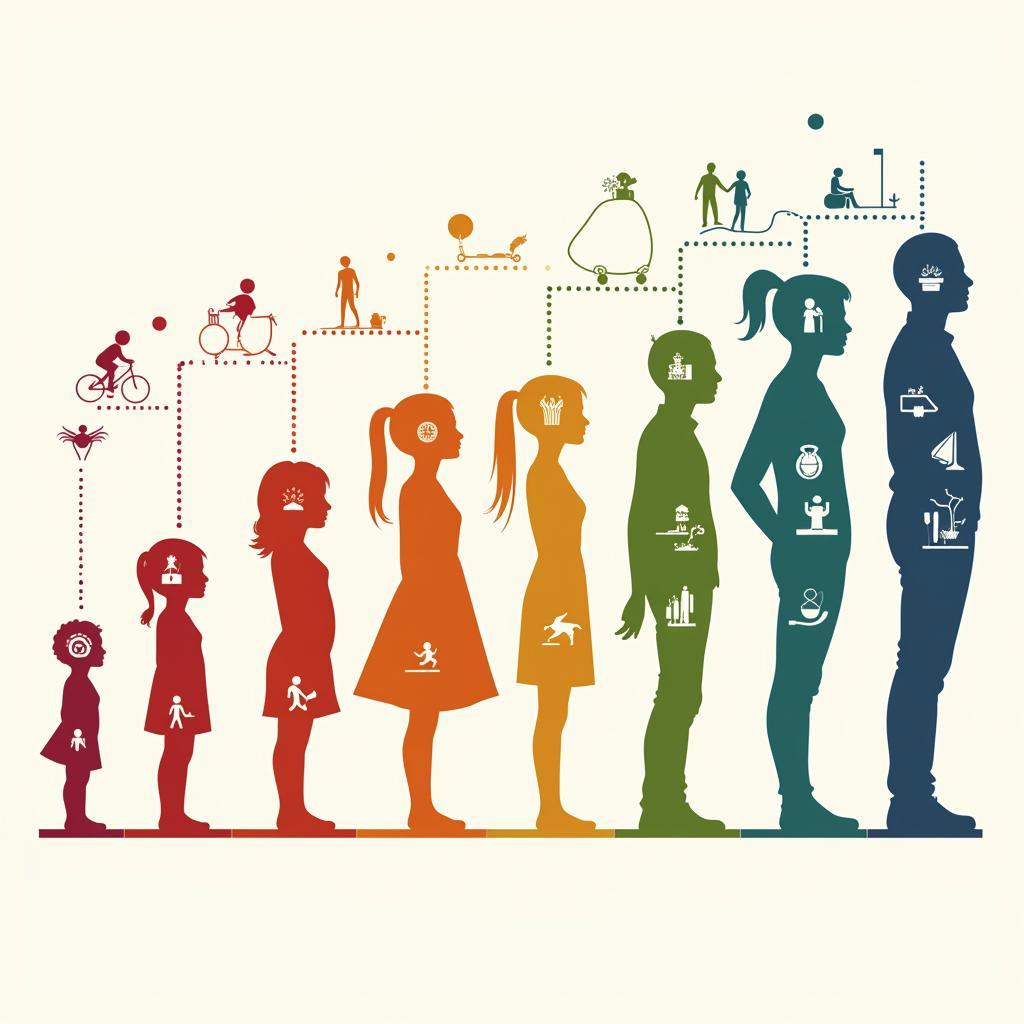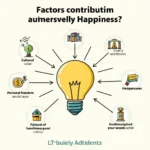IELTS Writing Task 2 questions about happiness and age differences have been a recurring theme in recent years. The topic “Are teenagers happier than adults?” is particularly relevant, as it touches on universal experiences and societal changes. Based on past exam trends, there’s a high probability of encountering similar questions in future IELTS tests. Let’s examine a related question that has appeared in actual IELTS exams:
Some people think that teenagers are generally happier than adults. Do you agree or disagree? Give reasons for your answer and include any relevant examples from your own knowledge or experience.
Analyzing the Question
This question requires candidates to:
- Take a clear stance (agree or disagree)
- Provide reasons to support their opinion
- Include relevant examples
- Compare the happiness levels of teenagers and adults
The key challenge is to present a well-balanced argument while maintaining a clear position throughout the essay.
Sample Essay 1 (Band 8-9)
Happiness is a complex emotion that varies greatly among individuals, regardless of age. While some argue that teenagers experience greater happiness than adults, I disagree with this generalization. In this essay, I will explain why I believe that happiness is not necessarily age-dependent and can be experienced differently by both teenagers and adults.
Firstly, teenagers often have fewer responsibilities and more freedom to explore life, which can contribute to their perceived happiness. They typically don’t have to worry about paying bills, maintaining a household, or supporting a family. This lack of financial and familial pressure can allow them to focus on personal interests and socializing, potentially leading to more carefree experiences. For example, a teenager might spend their weekend hanging out with friends or pursuing hobbies without major concerns about adult responsibilities.
However, adults have the advantage of greater emotional maturity and life experience, which can lead to a deeper, more nuanced sense of happiness. With age comes a better understanding of oneself and the world, allowing adults to find contentment in areas that might not appeal to teenagers. For instance, an adult might derive profound satisfaction from career achievements, raising children, or contributing to their community – experiences that are often beyond the reach or interest of most teenagers.
Moreover, happiness is highly subjective and influenced by various factors beyond age, such as personal circumstances, cultural background, and individual temperament. A teenager dealing with bullying or academic pressure might experience less happiness than an adult who has found fulfillment in their personal and professional life. Conversely, an adult struggling with midlife crisis or work-related stress might feel less happy than a teenager with a supportive family and a positive school environment.
In conclusion, while teenagers may experience moments of intense joy due to their life stage, it would be overly simplistic to claim that they are generally happier than adults. Happiness is a multifaceted concept that transcends age boundaries. Both teenagers and adults have the potential to experience deep happiness, albeit in different ways and contexts. The key to happiness, regardless of age, lies in personal growth, meaningful relationships, and finding purpose in life.
 Comparative chart showing happiness factors for teenagers and adults
Comparative chart showing happiness factors for teenagers and adults
Sample Essay 2 (Band 6-7)
The question of whether teenagers are happier than adults is a complex one. While some people believe that teenagers experience more happiness, I don’t fully agree with this idea. In this essay, I will discuss why I think both teenagers and adults can be happy in their own ways.
Teenagers often seem happier because they have fewer responsibilities. They don’t have to worry about paying bills or taking care of a family. Most teenagers live with their parents, who provide for their basic needs. This freedom from adult worries can make them appear more carefree and happy. For example, a teenager can spend time with friends or enjoy hobbies without thinking about work deadlines or financial problems.
However, adults can also experience deep happiness in different ways. They have more control over their lives and can make important decisions. Many adults find joy in their careers, relationships, and personal achievements. An adult might feel very happy after getting a promotion at work or buying their first house. These kinds of experiences are usually not available to teenagers.
It’s also important to remember that happiness depends on many things, not just age. Some teenagers struggle with problems like bullying or exam stress, which can make them unhappy. Similarly, some adults might be very content with their lives, while others face challenges like divorce or job loss that affect their happiness.
In my opinion, both teenagers and adults can be happy, but in different ways. Teenagers might experience more momentary excitement, while adults might have a more stable sense of satisfaction. For example, a teenager might feel extremely happy going to a concert with friends, while an adult might find lasting happiness in raising a family or pursuing a meaningful career.
To conclude, I don’t think it’s accurate to say that teenagers are generally happier than adults. Happiness is complex and varies from person to person. Both age groups have the potential to be happy, and what brings happiness can change as we grow older.
 Illustration comparing happiness factors across different age groups
Illustration comparing happiness factors across different age groups
Sample Essay 3 (Band 5-6)
Some people think teenagers are happier than adults. I partly agree with this idea. In this essay, I will talk about why teenagers can be happy and why adults can also be happy.
Teenagers are often happy because they have less stress. They don’t need to work or pay for things. Their parents take care of them. Teenagers can play with friends and do fun things. For example, my younger brother is always laughing and having fun with his school friends.
But adults can be happy too. They have jobs and can buy what they want. Many adults are happy when they get married or have children. My parents seem happy when they spend time with our family or go on holidays.
Sometimes teenagers are not happy. They might have problems at school or with friends. Some teenagers feel sad or worried about their future. Adults also have problems that make them unhappy, like losing a job or getting divorced.
I think both teenagers and adults can be happy in different ways. Teenagers might be happy because they are free and have fun. Adults might be happy because they have achieved their goals. It’s not easy to say who is happier.
In conclusion, I believe that happiness is not just about being a teenager or an adult. Everyone can be happy or sad at different times. It’s important to find things that make you happy at any age.
 Illustration depicting happiness across different life stages
Illustration depicting happiness across different life stages
Explanation of Band Scores
Band 8-9 Essay:
- Clear position and well-developed arguments
- Sophisticated vocabulary: “multifaceted,” “nuanced,” “transcends”
- Complex sentence structures
- Coherent paragraphs with clear topic sentences
- Relevant examples and personal insights
- Strong conclusion that reinforces the main argument
Band 6-7 Essay:
- Clear position with some development of ideas
- Good vocabulary with some less common words: “carefree,” “contentment”
- Mix of simple and complex sentences
- Generally coherent paragraphs
- Some examples, though less specific
- Conclusion that restates the main points
Band 5-6 Essay:
- Basic position with limited development
- Simple vocabulary with some repetition
- Mostly simple sentences
- Basic paragraph structure
- Few specific examples
- Simple conclusion that partially addresses the question
Key Vocabulary to Remember
- Contentment (noun) /kənˈtentmənt/ – A state of happiness and satisfaction
- Nuanced (adjective) /ˈnuːɑːnst/ – Characterized by subtle shades of meaning or expression
- Maturity (noun) /məˈtʃʊərəti/ – The state of being fully developed mentally or emotionally
- Perceive (verb) /pərˈsiːv/ – To become aware of or conscious of something
- Multifaceted (adjective) /ˌmʌltiˈfæsɪtɪd/ – Having many different aspects or features
- Subjective (adjective) /səbˈdʒektɪv/ – Based on personal feelings, tastes, or opinions
- Transcend (verb) /trænˈsend/ – To go beyond the limits of something
- Fulfillment (noun) /fʊlˈfɪlmənt/ – The achievement of something desired or promised
- Carefree (adjective) /ˈkeəfriː/ – Free from anxiety or responsibility
- Temperament (noun) /ˈtempərəmənt/ – A person’s nature or disposition
In conclusion, the question of whether teenagers are happier than adults is a complex and nuanced topic that requires careful consideration of various factors. As demonstrated in the sample essays, there are valid arguments on both sides, and the answer largely depends on individual circumstances and perspectives.
For future practice, consider exploring related topics such as:
- The impact of social media on happiness across different age groups
- The relationship between responsibility and life satisfaction
- How cultural differences affect perceptions of happiness at different life stages
We encourage readers to practice writing their own essays on this topic and share them in the comments section below. This active engagement will help improve your writing skills and prepare you for the IELTS Writing Task 2.


